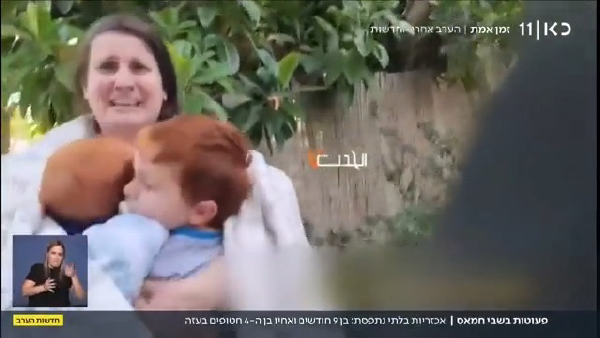By Leah Garber

There are images that are deeply burned into the mind and refuse to let go. Such is the picture of Shiri Bibas and her two children, nine-month-old Kafir and four-year-old Ariel. Two sweet redheads, embraced in their mom’s arms, while her terrified expression reveals the horrors. Shiri and her two boys were kidnapped into Gaza. The fate of Jordan, her husband, is unknown. We know he was kidnapped as well—wounded and apparently kept away from his family.
Thirty-eight days of hell have passed since the black Shabbat of October 7.
Baby Kfir is now 10 months old. Can he crawl around while being kept deep in the tunnels of terror? Have his innocent eyes gotten used to the darkness? Is he getting the baby food and nutrition he needs? Is Shiri’s comforting embrace, so close to his brother, enough to protect him, or did Hamas’s cruelty rob him of that too?
Thirty-eight days of endless pain surround us all like a black cloud. Thirty-eight days during which the eyes can’t stop tearing. A great anguish burdens every breath.
I know there is no word, sentence, or article that can encompass the intensity of the events that occurred on October 7, and yet I try. I try because I cannot remain silent in the face of the thundering calls of incitement—the hatred expressed by so many around the world—against my people.
These calls deafen my ears; they pierce my heart and scar my soul. I am a different person. This war, the degree of unimaginable cruelty, the barbarism whose magnitude is beyond what any human being can comprehend means images are censored. The monstrous face of antisemitism is spreading like a global pandemic as so many people buy into the lies spread by Hamas. All these new feelings have changed me forever. I believe these events have changed us all. October 7 marks a breaking line.
After 38 days, Israel entered a phase known as “war routine.” It’s a sad routine. The saddest we’ve ever known, but one that makes its way with moderate steps, aiming to bring us back to life—because we must return.
It’s a routine in which every slamming door sounds like a siren. A routine in which every knock on the door is answered with trepidation; every time the phone rings our hearts miss a beat. What is waiting on the other side of the door? On the other end of the phone line?
It is a war routine in which you see couples on the street and one of them is carrying a rifle and the other can’t stop touching them. You know it is a fighter who has come home for a 24-hour leave, what is known in Israel as an “AFTER.” Although all you want to do is approach the soldier and offer your thanks with a big hug, you dare not rob the couple of the precious minutes they have for themselves together, so you whisper “Take care…” instead.
It is a routine of war where news is consumed like air, where newscasters and war commentators are the most popular figures in every household.
This is a routine in which all TV commercials are related to the war—endless promotion of products will relieve our stress, ease the tension, and help us through this difficult time.
It’s a war routine in which people have stopped asking each other “What’s up?” because the answer is known. It’s a war routine in which no one plans more than a day ahead because who knows what will happen tomorrow. It’s a war routine in which we’ve learned to breathe shallowly. Despite the great tension, everyone has more patience, and the sense of shared destiny is more than a slogan. This is a war routine in which digital road signs in the middle of freeways proclaim: יחד ננצח |“Together we will win,” which has become the war’s slogan and is added to official texts and screens all over.
It is a war routine in which the whole country is painted in the patriotic blue and white of Israeli flags alongside yellow ribbons in solidarity with the hostages.
It’s the kind of routine in which news flashes begin with the sentence: “We can now share….” and every Israeli knows what will follow are names of soldiers who have been killed, creating new bereaved families and more children who will grow up without a father, including the children of Yossi Hershkowitz who was killed this weekend. Yossi, an outstanding violinist, was an educator and the principal of a well-known high school in Jerusalem. He continued his important work as an educator, even from the battlefield. Just a few days before he was killed, he recorded a video message to his students. A message that now becomes his testament: “There is no left or right, religious or secular among us. We are all Jews. We are an iron fist. I miss you all and ask that you never slander anyone.”
It is a routine in which hotels are no longer for holidays and dream vacations but rather are a refuge for homeless Israelis who no longer have a home to go back to or can’t go back until the war is over.
It is a routine in which the sadness is constantly present, the eyes are always red. There is no desire to do anything except to cry out loud to the world that we are fighting for our home in a war that is just. Until our soldiers can guarantee that it is safe to live here, we will all wait for them with great love and with all the necessary patience because we have no other choice!
Together, united, we will overcome.
Leah Garber is a senior vice president of JCC Association of North America and director of its Center for Israel Engagement in Jerusalem.
Reader Interactions